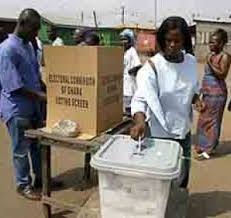Voters in Ghana selected their next president Friday in a ballot expected to mark the sixth transparent election in this West African nation, known as a beacon of democracy in a tumultuous region.

Proud of their democratic heritage, residents of this balmy, seaside capital trudged to the polls more than four hours before the sun was even up, standing inches apart in queues that in some places stretched 1,000-people deep.
By afternoon, some voters were getting agitated, after hitches with the use of a new biometric system caused delays at numerous polling stations.
Each polling station had a single biometric machine, and if it failed to identify the voter’s fingerprint, or if it broke down, there was no backup. At one polling station where the machine had broken down, a local chief said he’d barely moved a few inches: “I’m 58 years old, and I’ve been standing in this queue all day,” Nana Owusu said. “It’s not good.”
Late Friday, when it became clear that large numbers of people had not been able to vote, the election commission announced it would extend voting by a second day. This nation of 25 million is, however, deeply attached to its tradition of democracy, and voters were urging each other to remain calm while they waited their turn to choose from one of eight presidential contenders, including President John Dramani Mahama and his main challenger, Nana Akufo-Addo. The election commission
“Elections remind us how young our democracy is, how fragile it is,” said author Martina Odonkor, 44. “I think elections are a time when we all lose our cockiness about being such a shining light of democracy in Africa, and we start to get a bit nervous that things could go back to how they used to be.”
Ghana was once a troubled nation that suffered five coups and decades of stagnation, before turning a corner in the 1990s. It is now a pacesetter for the continent’s efforts to become democratic. No other country in the region has had so many elections deemed free and fair, a reputation voters hold close to their hearts.
The incumbent Mahama, a former vice president, was catapulted into office in July after the unexpected death of former President John Atta Mills. Before becoming vice president in 2009, the 54-year-old served as a minister and a member of parliament. He’s also written an acclaimed biography, recalling Ghana’s troubled past, called “My First Coup d’Etat.”
Akufo-Addo is a former foreign minister and the son of one of Ghana’s previous presidents. In 2008, Akufo-Addo lost the last presidential election to Mills by less than 1 percent during a runoff vote. Both candidates are trying to make the case that they will use the nation’s oil riches to help the poor.
Besides being one of the few established democracies in the region, Ghana also has the fastest-growing economy. But a deep divide still exists between those benefiting from the country’s oil, cocoa and mineral wealth and those left behind financially.
A group of men who had just voted gathered at a small bar a block away from a polling station in the middle class neighborhood of South Labadi. Danny Odoteye, 36, who runs the bar, said that the country’s economic progress is palpable and that the ruling party, and its candidate, are responsible for ushering in a period of growth.
“I voted for John Mahama,” he said. “Ghana is a prosperous country. Everything is moving smoothly.”
Administrator Victor Nortey, sitting on a plastic chair across from him, disagreed, saying the country’s newfound oil wealth should have resulted in more change.
“I voted for Nana Akufo-Addo,” He said. “Now we have oil. What is Mahama doing with the oil money?” Nortey said. “We can use that money to build schools.”
In an interview on the eve of the vote, Akufo-Addo told The Associated Press that the first thing he will do if elected is begin working on providing free high school education for all. “It’s a matter of great concern to me,” he said, adding that he plans to use the oil wealth to educate the population, industrialize the economy and create better jobs for Ghanaians.
Policy-oriented and intellectual, Akufo-Addo is favored by the young and urbanized voters. He was educated in England and comes from a privileged family. The ruling party has depicted him as elitist.
“The idea that merely because you are born into privilege that automatically means you are against the welfare of the ordinary people, that’s nonsense,” he said.
Ghana had one of the fastest growing economies in the world in 2011. Oil was discovered in 2007 and the country began producing it in December 2010.
Throughout the capital, new condominiums are rising up next to slums and luxury cars creep along narrow alleys lined with open sewers. A mall downtown features a Western-style cinema and is packed on weekends with middle class families. At the same time shantytowns are cropping up, packed with the urban poor.
Polls show that voters are almost evenly split over who can best deliver on the promise of development.
Kojo Mabwa said that he is voting for Akufo-Addo, because he is impressed by his promise of free education. He dismissed critics that say the project is too ambitious. “There is money,” he said. “(The ruling party) has done nothing for us. They are misusing our money.”
Paa Kwesi, a 30-year-old systems analyst, said he doesn’t think Akufo-Addo is making promises he can keep.
“He says he can do free education, but you have to crawl before you can walk. It’s not possible,” he said.
__
Associated Press writer Francis Kokutse contributed to this report from Accra, Ghana.
sourche:The Associated Press
Δεν υπάρχουν σχόλια:
Δημοσίευση σχολίου